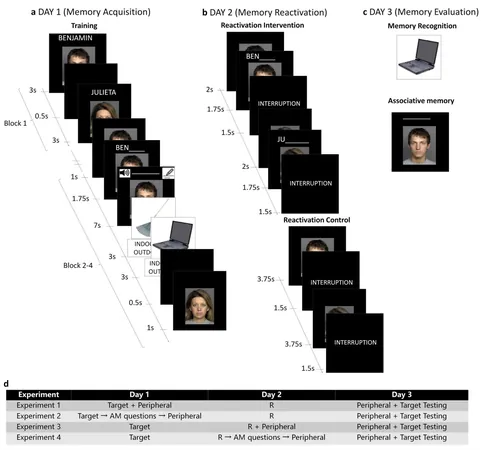
Unlocking the Secrets of Memory: Reactivating One Memory Can Boost Others!
2025-05-23
Author: Wei
The Fascinating World of Episodic Memory
Did you know that our brains possess the incredible ability to recall specific events and experiences for years? This powerful function, known as episodic memory, finds its strength in the dynamic interplay of neurons within the hippocampus and medial temporal lobe.
Associative Nature of Memory
Research has shown that episodic memory operates on an associative basis. For instance, recalling a significant milestone like a graduation often triggers memories of related events, such as the celebrations that followed.
A Groundbreaking Study Explores Memory Reactivation
In an intriguing new study from Biología Molecular y Neurociencias (IFIByNE)-CONICET and the University of Buenos Aires, researchers have discovered that reactivating specific memories not only strengthens those recollections but can also enhance related memories.
Published in Communications Psychology, the study dives deep into the process of how consolidated memories can be indirectly fortified when linked memories are brought to mind. Lead researchers Juan Cruz Beron and Luz Bavassi elegantly framed the inquiry, stating, "This study investigated whether reactivation of a consolidated target memory could indirectly enhance retention of peripheral information acquired in the same context."
Unlocking the New Dimensions of Memory
Previous research predominantly focused on freshly formed memories, yet Beron and Bavassi sought to understand whether previously established memories can benefit from further reinforcement when contextually associated memories are recalled.
To examine this, the team conducted four experiments with 238 adult participants. Initially, subjects learned to associate faces with names alongside everyday objects—these became their target and peripheral memories.
The Experiment: A Four-Day Journey into Memory
Over four days, participants engaged in various tasks. On the second day, some were prompted with incomplete cues to trigger the memories of the previous day while others completed an unrelated task.
On the third day, the results emerged: participants who had their memories reactivated exhibited significantly better recall of both the target and peripheral information compared to those who did not.
The Context is Key!
The findings revealed that memory reactivation could enhance recall significantly when the memories were formed in a shared context. However, if those peripheral memories were learned in a different environment, the boosting effect vanished.
This groundbreaking research underscores the importance of context in memory reactivation, suggesting that our memories are intricately linked to their spatial and temporal origins.
A New Era in Memory Research
These revelations not only shed light on how our memory works but also pave the way for future studies. Understanding these reactivation mechanisms could transform our grasp of human memory, opening doors to innovative therapies for memory-related challenges.
Stay tuned, as this exciting area of research continues to evolve, promising to unlock even more about the intricate web of our memories!


 Brasil (PT)
Brasil (PT)
 Canada (EN)
Canada (EN)
 Chile (ES)
Chile (ES)
 Česko (CS)
Česko (CS)
 대한민국 (KO)
대한민국 (KO)
 España (ES)
España (ES)
 France (FR)
France (FR)
 Hong Kong (EN)
Hong Kong (EN)
 Italia (IT)
Italia (IT)
 日本 (JA)
日本 (JA)
 Magyarország (HU)
Magyarország (HU)
 Norge (NO)
Norge (NO)
 Polska (PL)
Polska (PL)
 Schweiz (DE)
Schweiz (DE)
 Singapore (EN)
Singapore (EN)
 Sverige (SV)
Sverige (SV)
 Suomi (FI)
Suomi (FI)
 Türkiye (TR)
Türkiye (TR)
 الإمارات العربية المتحدة (AR)
الإمارات العربية المتحدة (AR)